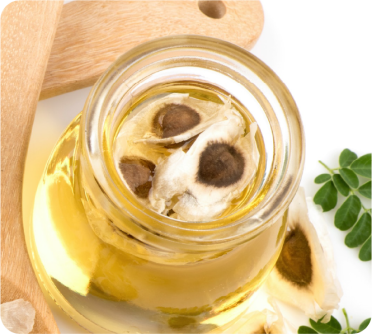
Moringa oil
What is moringa oil?
Moringa oil is derived from the seeds of Moringa oleifera, a small tree native to the Himalayan mountains. Virtually all parts of the moringa tree, including its seeds, roots, bark, flowers, and leaves, can be used for nutritional, industrial, or medicinal purposes.
For this reason, it’s sometimes referred to as “the miracle tree.” It’s also called the drumstick tree, in reference to the shape of its seed pods.
Moringa seeds have a high oil content and contain many nutritional compounds, including monounsaturated fats, protein, sterols, and tocopherols. Moringa oil is produced through a variety of industrial processes, including solvent extraction and cold-pressing.
It’s available as an essential oil and as a cooking oil. It’s also an ingredient in hair and skin products.


Moringa oil uses and benefits
Moringa oil has been used as a medicinal folk cure and as a topical, cosmetic ingredient since ancient times. Today, moringa oil is manufactured for a wide range of personal and industrial uses.
● Cooking oil. Moringa oil is high in protein and oleic acid, a monounsaturated, healthy fat. When used for cooking, it’s an economical, nutritious alternative to more expensive oils. It’s becoming a widespread nutritional staple in food-insecure areas where moringa trees are grown.
● Topical cleanser and moisturizer. Moringa oil’s oleic acid makes it beneficial when used topically as a cleansing agent, and as a moisturizer for skin and hair.
● Cholesterol management. Edible moringa oil contains sterols, which have been shown
● Trusted Source
● to lower LDL or “bad” cholesterol.
● Antioxidant. Beta-sitosterol, a phytosterol found in moringa oil, may have antioxidant and antidiabetic benefits, although more research is needed to confirm this.
● Anti-inflammatory. Moringa oil contains several bioactive compounds which have antioxidant and anti-inflammatory properties, both when ingested and used topically. This may make moringa oil beneficial for acne breakouts. These compounds include tocopherols, catechins, quercetin, ferulic acid, and zeatin.
Moringa oil can be found as:
● Cooking oil to be used in frying and baking.
● Essential oil to be used topically on skin and hair. Always dilute any essential oil with a carrier oil before using.
● An ingredient in skin and hair care products, such as soap, liquid cleanser, hydrating toner, massage oil, shampoo, and hair conditioner.
Moringa oil for hair and skin
There are commercially-produced products, such as Herbal Essences Golden Moringa Oil for hair, that may provide easy-to-access benefits.
You can also create a skin or hair care oil treatment with moringa essential oil.
Benefits of Moringa Oil for Skin
● Hydrates skin: "Moringa oil is 40 percent monounsaturated fatty acids, with 70 percent of that being oleic acid," says King. "This makes it great for supporting the skin barrier, which seals in hydration and protects us from environmental insults. This means that it is a good moisturizer, very cleansing, and beneficial for dry and sensitive skin."
● Anti-aging ingredient: Providing that the product is comprised of "relatively fresh oil with low free oleic acid content," says Olioso, it will be effective at plumping fine lines and contributing to an overall more youthful appearance.
● Healing properties: Because of its emollient properties, moringa is a solid choice for applying to minor cuts, burns, and scrapes.2
● Balances natural oils: "Moringa oil is also similar to the oil naturally produced by our skin, which means that it can help to balance and nourish all skin types without being greasy," says King.
● Antimicrobial: "It has antimicrobial and anti-inflammatory properties as well, and because of its high content of vitamin E, it also has potent antioxidant properties," says King.
● Combats breakouts: The anti-inflammatory properties may also help contribute to clearer skin, counteracting breakouts.3 "It is an ingredient commonly used to address skin issues like pigmentation, fine lines and wrinkles, and even acne-prone skin," says Zeichner.
● Therapeutic: Moringa is often used in aromatherapy products as a carrier oil (due to its long shelf life).